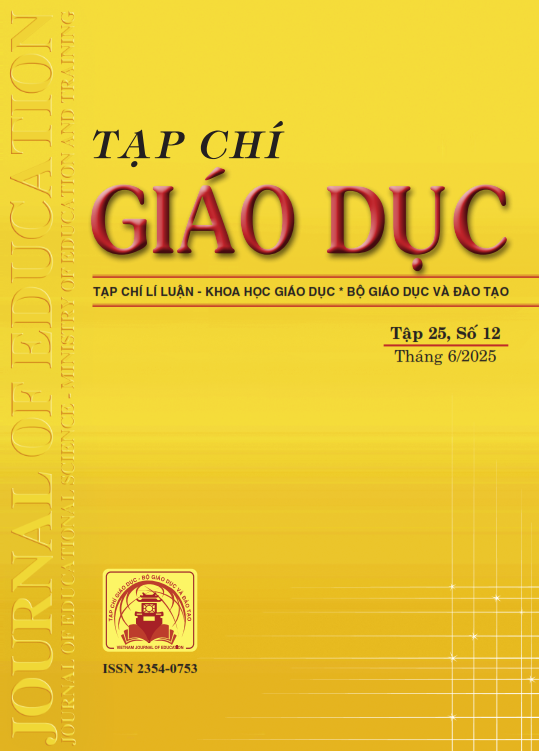Phát triển năng lực số cho sinh viên sư phạm tại Việt Nam: Mô hình tiếp cận và giải pháp
Tóm tắt
Despite the existing body of research on digital competence development in general, specific solutions tailored to pre-service teachers in Vietnam remain limited. Drawing upon established theoretical models of digital competence development, this study proposes a set of solutions for fostering digital competence among pre-service teachers. These solutions encompass a comprehensive implementation process for digital competence development, alongside solution clusters addressing curriculum, teaching and learning activities, the learning environment, and faculty development. The proposed solutions provide a foundation for subsequent empirical evaluation to assess their effectiveness in enhancing digital competence among pre-service teachers in the Vietnamese context.
Tài liệu tham khảo
American Library Association (2015). Framework for information literacy for higher education. Association of College and Research Libraries. https://www.ala.org/acrl/standards/ilframework
An Biên Thuỳ, Nguyễn Thị Lan Ngọc, Trịnh Thị Phương Thảo (2024). Đề xuất khung năng lực số cho sinh viên sư phạm tại Việt Nam. Tạp chí Giáo dục, 24(22), 1-6.
Bonwell, C. C., & Eison, J. A. (1991). Active learning: Creating excitement in the classroom. ERIC Clearinghouse on Higher Education. https://eric.ed.gov/?id=ED336049
Bùi Minh Đức (2019). Xây dựng chuẩn đầu ra trong đào tạo cử nhân sư phạm đáp ứng yêu cầu đổi mới giáo dục. Tạp chí Khoa học Giáo dục Việt Nam, 14, 1-6.
Chang, J. H., & Huynh, P. (2016). ASEAN in transformation: The future of jobs at risk of automation (Bureau for Employers’ Activities, Working Paper No. 9). International Labour Office.
Châu Thị Hồng Nhự (2024). Đề xuất khung năng lực số trong dạy học cho sinh viên sư phạm ở trường đại học. Tạp chí Giáo dục, 24(số đặc biệt 5), 1-7.
D’Angelo, C. (2018). The impact of technology: Student engagement and success. University of Ontario Institute of Technology.
Đỗ Văn Hùng (chủ biên, 2021). Năng lực số 2021. Khung năng lực số dành cho sinh viên. Khoa Thông tin - Thư viện, Trường Đại học Khoa học Xã hội và Nhân văn - Đại học Quốc gia Hà Nội.
Eryansyah, E., Petrus, I., Indrawati, S., & Ernalida, E. (2020). Pre-service EFL teachers’ digital literacy and factors affecting digital literacy development. Indonesian Research Journal in Education |IRJE|, 4(2), 402-412. https://doi.org/10.22437/irje.v4i2.10892
Foulger, T. (2023). Technology infusion in teacher preparation. EdTechnica. https://doi.org/10.59668/371.14237
Guthrie, J. T., & Davis, M. H. (2003). Motivating struggling readers in middle school through an engagement model of classroom practice. Reading & Writing Quarterly, 19(1), 59-85. https://doi.org/10.1080/10573560308203
Hamilton, E. R., Rosenberg, J. M., & Akcaoglu, M. (2016). The substitution augmentation modification redefinition (SAMR) model: A critical review and suggestions for its use. TechTrends, 60(5), 433-441. https://doi.org/10.1007/S11528-016-0091-Y
Hồ Huyền Trang, Mai Thị Phương (2024). Đề xuất khung năng lực số đáp ứng nhu cầu học tập suốt đời cho học viên người lớn ở trung tâm học tập cộng đồng. Tạp chí Giáo dục, 24(số đặc biệt 12), 22-28.
Jiménez-Cortés, R., Vico-Bosch, A., & Rebollo-Catalán, A. (2017). Female university student’s ICT learning strategies and their influence on digital competence. International Journal of Educational Technology in Higher Education, 14(1). https://doi.org/10.1186/s41239-017-0040-7
Killen, C. (2018). Collaboration and coaching: Powerful strategies for developing digital capabilities. Digital Literacy Unpacked, 18, 29-44. https://doi.org/10.29085/9781783301997.005
Kim, H. J., Hong, A. J., & Song, H. D. (2018). The relationships of family, perceived digital competence and attitude, and learning agility in sustainable student engagement in higher education. Sustainability (Switzerland), 10(12). https://doi.org/10.3390/su10124635
Koehler, M. J., Mishra, P., & Cain, M. W. (2017). What is technological pedagogical content knowledge (TPACK)? Teachers College Record, 119(6), 1-34. https://doi.org/10.1177/002205741319300303
Law, N., Woo, D., de la Torre, J., & Wong, K. (2018). A global framework of reference on digital literacy skills for indicator 4.4.2. UNESCO Institute for Statistics. http://hub.hku.hk/handle/10722/262055
Lillo, E. A. G. (2023). Analysis of requirements for the digital competence of a future teacher Elvira. European Journal of Educational Research, 12(4), 1667-1681. https://doi.org/10.59301/ejer.1238821
Mishra, P., & Koehler, M. J. (2006). Technological pedagogical content knowledge: A framework for teacher knowledge. Teachers College Record, 108(6), 1017-1054. https://doi.org/10.1111/J.1467-9620.2006.00684.X
Puentedura, R. (2010). SAMR and TPCK: Intro to advanced practice. http://hippasus.com/resources/sweden2010/ SAMR_TPCK_IntroToAdvancedPractice.pdf
Selwyn, N. (2016). Is technology good for education? In Is technology good for education? Polity Press. https://research.monash.edu/en/publications/is-technology-good-for-education
Stoll, L., & Louis, K. S. (Eds.). (2007). Professional learning communities: Divergence, depth and dilemmas. Open University Press/McGraw Hill.
UNESCO (2018). Digital competence frameworks for teachers, learners and citizens. https://unevoc.unesco.org/ home/Digital+Competence+Frameworks
Wild, S., & Schulze Heuling, L. (2020). How do the digital competences of students in vocational schools differ from those of students in cooperative higher education institutions in Germany? Empirical Research in Vocational Education and Training, 12(1). https://doi.org/10.1186/s40461-020-00091-y
Xin, N. S., Shibghatullah, A. S., Subaramaniam, K. A., & Wahab, M. H. A. (2021). A systematic review for online learning management system. Journal of Physics: Conference Series, 1874(1). https://doi.org/10.1088/1742-6596/1874/1/012030
Tải xuống
Đã Xuất bản
Cách trích dẫn
Số
Chuyên mục
Giấy phép

Tác phẩm này được cấp phép theo Ghi nhận tác giả của Creative Commons Giấy phép quốc tế 4.0 .












